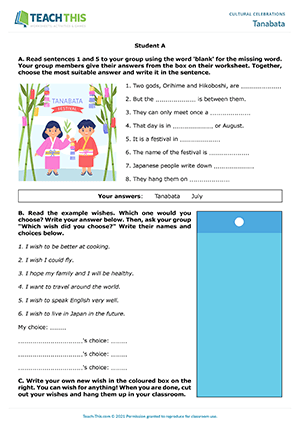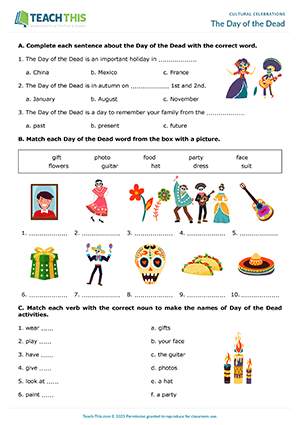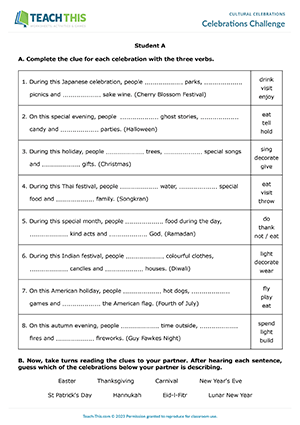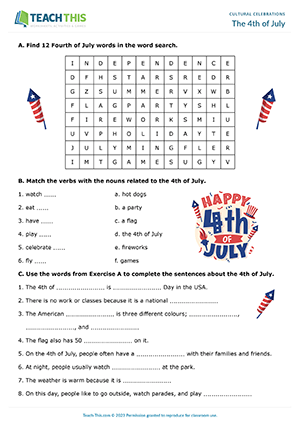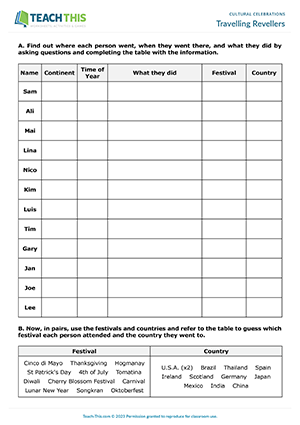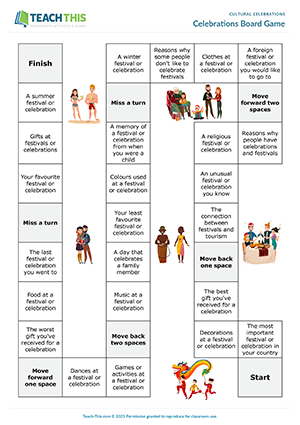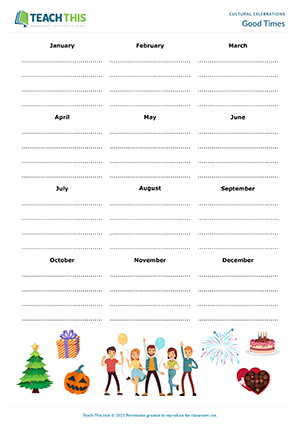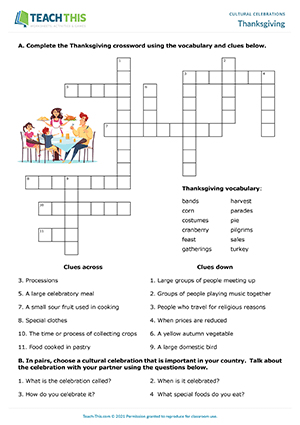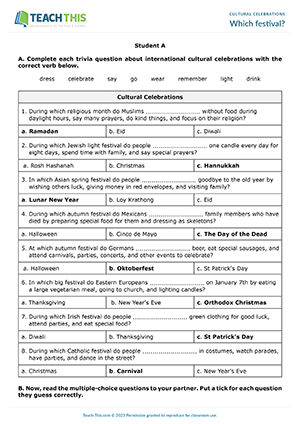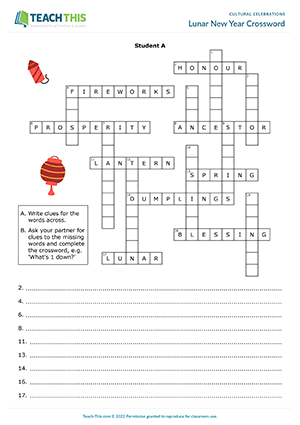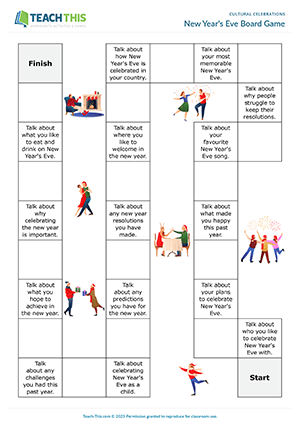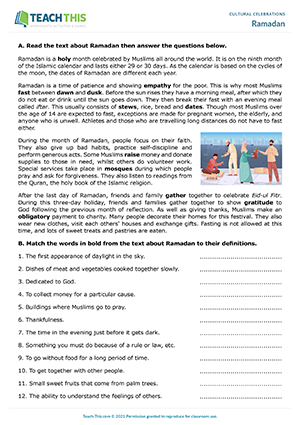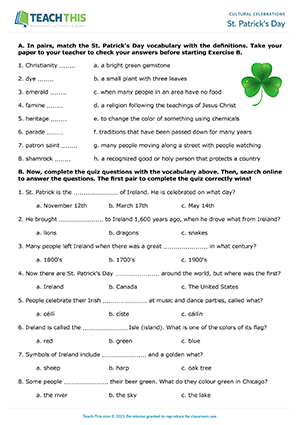In this insightful Tanabata activity, students learn about the Japanese festival of Tanabata and take part in one of the traditions by writing wishes on a tanzaku. First, students work together to complete sentences about the Japanese festival of Tanabata. Students take turns reading one of their assigned sentences to the group using the word 'blank' for the missing word. The group members then each read the two answers in their answer box. Together, the group chooses the most suitable answer and everyone writes it in the sentence on their worksheet. Next, students read example wishes and choose the one that is most suitable for them. Students then ask their group members for their wishes and write their names and choices on the worksheet. After that, students write their own wishes in a coloured box. The coloured box resembles a tanzaku—a paper used to write Tanabata wishes. Finally, students cut out their wishes and use them to decorate the classroom.
This free Day of the Dead worksheet helps students practice vocabulary related to this Mexican holiday. First, students complete Day of the Dead sentences with the correct word. Students then match Day of the Dead words with pictures. Next, students match each verb with a suitable noun to make the names of Day of the Dead activities. After that, students use words from a box to complete sentences about the Day of the Dead. Students then move on to circle the odd word out in each line and write why the word does not belong to the group. Finally, students complete sentences about the Day of the Dead with their own ideas and then compare their answers with a partner. Afterwards, students share their ideas with the class.
This enjoyable cultural celebrations activity helps students practice the names of popular cultural celebrations and related verbs. First, in two groups, students complete clues for different cultural celebrations with verbs. Next, students pair up with someone from the other group and take turns reading each clue to their partner, who guesses which celebration from their worksheet is being described. For each correct guess, students score one point. The student with the most points at the end of the activity wins.
This comprehensive 4th of July worksheet helps students practice vocabulary related to American Independence Day. First, students find 12 Fourth of July words in a word search. Students then match verbs with nouns related to the 4th of July. Next, students use the words from Exercise A to complete sentences about the 4th of July. After that, students categorise related words into places, activities, or food and drink, adding at least two additional words to each category. Students then complete a 4th of July party invitation email with their own ideas. Following that, students underline the correct words to complete conversation questions. Lastly, students ask and answer the questions with a partner, giving reasons and details.
This cultural celebrations role-play activity helps to familiarise students with the names of different cultural celebrations and festivals. In groups, students take on the roles of travellers who have attended different celebrations around the world. The students' task is to find out where each person went, when they went there, and what they did by asking questions and completing a table with the information. Students begin by writing their own information in the table. Students then go around the group, asking and answering the questions and noting down the answers in their tables. When the students have finished, they use the festivals and countries shown at the bottom of the worksheet and refer to the table to guess which festival each person attended and the country they went to, completing the table with their guesses. Finally, go through the correct answers with the class.
This fun cultural celebrations board game helps students talk about various celebrations and festivals. In groups, students take turns rolling the dice and moving their counter along the board. When a student lands on a square, they talk about the topic on the square for 30 seconds without stopping. Unless the square specifies that students talk about a foreign festival, they talk about festivals and celebrations in their own countries. If a student can't think of anything to say or stops talking before the 30 seconds are up, they go back to their previous square. The first student to reach the finish wins the game.
In this free cultural celebrations speaking activity, students talk about personal and public celebrations they have throughout the year. Working alone, students write down all the celebrations they have throughout the year in a monthly calendar on the worksheet and make notes on how they celebrate each one. In pairs, students then take it in turns to interview their partner about the celebrations, e.g. 'Do you celebrate anything in January?' Students also ask follow-up questions about each celebration to gain as much information as possible, e.g. 'How do you celebrate Valentine's Day?' Afterwards, students give feedback to the class on one of their partner's celebrations.
In this useful Thanksgiving worksheet, students learn about the American celebration of Thanksgiving and related vocabulary by completing a variety of exercises. First, students read a text about Thanksgiving. Students then read a series of statements about the text and indicate whether they are true or false by circling the correct answer. Next, students answer comprehension questions about the text in their own words. After that, students complete a Thanksgiving crossword using the key vocabulary from the text and a set of clues. Lastly, students pair up and choose a cultural celebration that is important in their country. Students then talk about the celebration with their partner using the questions shown.
In this engaging cultural celebrations trivia quiz activity, students complete trivia questions about cultural celebrations with common verbs and then ask them to a partner. In two groups, students complete each trivia question about international cultural celebrations with the correct verb. Next, students pair up with someone from the other group and take turns reading their multiple-choice questions to their partner, who tries to guess the correct answer. Students put a tick next to each of their partner's correct guesses. The student with the most correct guesses at the end of the activity wins.
In this productive Lunar New Year activity, students complete a crossword by describing and guessing words related to the festival. In two groups, students invent and write down clues for the Lunar New Year words on their crossword. Students then pair up with someone from the other group and take it in turns to ask their partner for a clue to one of their missing words. Their partner reads out the clue for that Lunar New Year word and the other student tries to guess what it is. If the student guesses the word successfully, they write it on their crossword. If not, their partner continues to give more clues until the student is able to guess the word. When the students have finished, they check their spelling by comparing crosswords.
In this free New Year's Eve board game, students practice vocabulary related to New Year's Eve and talk in response to topic-related prompts. Players take turns rolling the dice and moving their counter along the board. If a player lands on a 'Talk about' square, they talk in response to the New Year's Eve prompt for 30 seconds without stopping. If a player can't think of anything to say or stops talking before the 30 seconds are up, they go back two squares. If a player lands on a blank square, another student picks up a card and reads out the question on the card, followed by three possible multiple-choice answers. The player then has ten seconds to answer. If the player answers correctly, they remain on the square. If not, they move their counter back two squares. The first player to reach the finish wins the game.
In this detailed Ramadan worksheet, students learn about the Muslim holiday Ramadan and its associated vocabulary. First, students read a text about Ramadan and match words from the text to their definitions. Students then answer true or false questions about the information in the reading by circling the correct answer. Students then move on to answer multiple-choice questions about Ramadan. In the last exercise, students answer questions about Ramadan.
In this entertaining St. Patrick's Day activity, pairs of students race to search for information about St. Patrick's Day in order to complete a matching activity and quiz the fastest. Pairs begin by matching St. Patrick's Day vocabulary to definitions. Next, pairs complete quiz questions with the vocabulary from the first exercise. Pairs then search online in English to find the answers to the quiz questions. The first pair to correctly answer all the quiz questions wins.
Latest Free
Resources
- The Bus Stop
Getting Around (B1)
Date Added: 1st of October
- Study Skills Showdown
Study Skills (B2)
Date Added: 10th of September
- Everyday Objects Bingo
Everyday Objects (A1-A2)
Date Added: 25th of August
- Action Verb Races
Actions (A1-A2)
Date Added: 18th of August
- Birthday Basics
Birthdays (A1-A2)
Date Added: 8th of August
Latest Member
Resources
- Casual Greetings
Greetings and Introductions (B2)
Date Added: 22nd of October
- Identifying and Clarifying Problems
Dealing with Problems (B2)
Date Added: 22nd of October
- What if we tried...?
Dealing with Problems (B2)
Date Added: 22nd of October
- Suitable Excuses
Making Excuses (B2)
Date Added: 21st of October
- Superlatives Showdown
Superlatives (A1-A2)
Date Added: 21st of October



